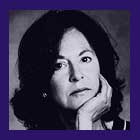 Photo: Sigrid Estrada
Photo: Sigrid Estrada
Poet Laureate: Louise Glück and the Public Face of a Private Artist
By Andrew Johnston
The New York Times
November 4, 2003
PARIS
Anyone hearing Louise Glück's reaction when the
Library of Congress recently named her as the poet
laureate might be forgiven for thinking she was the last
person to become America's official poet. "I have very
little taste for public life in the way that they
understand it," she told The Boston Globe. "I didn't think
I was the sort of person they'd ever look at."
But you are chosen to be laureate not because of what sort of person you are but because of what sort of poet you are. Never mind that she shuns the limelight, and will probably continue to do so. Ms. Glück is an inspired choice because she excels in doing the kind of thing that only lyric poetry can do, which is among the most intimate, nonpublic things words can do: mimic the peculiar music of thought itself. Her appointment sheds interesting light on a private art's public existence.
Some of Ms. Glück's predecessors made almost evangelical efforts to whip up public enthusiasm for poetry. Robert Hass (1995-1997) started the "Poet's Choice" column in The Washington Post. Robert Pinsky (1997-2000) began the Favorite Poem Project. Billy Collins, who handed the laureateship to Glück on Oct. 21, started a Web site aimed at encouraging the daily reading of poems in high schools.
There's nothing wrong with trying to bolster an art form's public profile, but these campaigns had an air of artificial resuscitation about them that seemed only to confirm poetry's marginal status in America as something largely confined to academia, or greeting cards, or undergraduate courtship rituals. They favored poems easily digested and easily forgotten, poems that seemed to feel obliged to thank you for your time by sending you away with a warm little glow.
Ms. Glück, on the other hand, writes startling, ironic poems in a stark, unadorned voice. I once heard her read her collection "Meadowlands" (1996) right through and realized that her characterization of "The Best American Poetry 1993," which she edited, could have been a description of her own work: "The voice that rises from the page is weirdly restless: seductive, demanding, embittered, witty."
A slightly wraithlike, black-clad figure, Ms. Glück held a theater in thrall with expert comic timing. Many of her contemporaries cultivate a studied, precious sincerity; with Ms. Glück, one gets the sense that to believe in your own sincerity may be the worst form of self-delusion. Her poems send you out into the world a little colder but wide awake, with that voice of hers ringing in your head.
Voice, with Ms. Glück, is everything. "The poem will not survive on content but through voice," she wrote. "By voice I mean the style of thought, for which a style of speech never convincingly substitutes."
Ms. Glück's poems survive, as she has survived, through an unflinching analysis of her own life, not in order to wallow in self-pity but to strive after a kind of intensely self-critical honesty. They owe more than a little to the psychoanalysis she began after being diagnosed with anorexia when she was at college: her poems examine the stories we repeat to ourselves in order to imagine an escape from them.
In her early books Ms. Glück's voice was chillingly oracular, the poems full of unforgettable symbols. Their culmination was "The Wild Iris" (1992), a strange and wonderful book in which the radical search for self is narrated by a curious collection of onlookers -- flowers, mostly, but also the sunset, the wind and various kinds of twilight. The book, still Ms. Glück's best, earned her a Pulitzer Prize.
Since then, Ms. Glück has turned away from symbol to a more laconic kind of self-questioning. "Meadowlands" alternates retold episodes from the Odyssey with bitter and funny exchanges from a disintegrating marriage: "I hate that you refuse/ to have people at the house. Flaubert/ had more friends and Flaubert/ was a recluse."
In her most recent book, "The Seven Ages" (2001), Ms. Glück writes: "We respect, here in America,/ what is concrete, visible. We ask/ What is it for? What does it lead to?" Poetry, in this utilitarian, unpoetic age, is marginal because in most respects it is marvelously useless and because it is unmarketable (if there were a stock market for poetry it would have to be a futures market). But Ms. Glück knows that poetry is useful in a vital way. If you don't know yourself, her poems imply, how can you begin to imagine what other people need?
She is likely to honor the laureateship in the best way possible: by going on writing poetry.
© The New York Times / International Herald Tribune